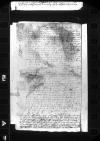List #3864
[Ioannes DANTISCUS] do Sigismund I JagiellonHeilsberg (Lidzbark Warmiński), 1539-03-03
Regest polski:
Dantyszek dziękuje za łaskę okazaną jego poddanym. Obiecuje zadbać, by nie stało się to dla innych przykładem na przyszłość, a także by poddani byli bardziej skłonni do płacenia podatku.
W związku z doniesieniami o gromadzeniu się w nieznanym celu floty na Bałtyku Dantyszek zalecił radzie Gdańska opatrzenie portu. Prosi króla, aby również on to nakazał.
Rękopiśmienne podstawy źródłowe:
Publikacje:
| ||||||
Tekst + aparat krytyczny + komentarzZwykły tekstTekst + komentarzTekst + aparat krytyczny
Serenissima
Humillimam perpetuae fidei et servitutis meae commendationem.
Pro ea vere regia in subditos meos beneficentia et gratia, qua revera hoc tempore summopere eguerunt, Serenissimae Maiestati Vestrae, quas possum, gratias habeo immortales. Et ne illa, ut Serenissima Maiestas Vestra mihi scribi cf.
Ceterum, quae nunc sunt tempora et quae in hominibus fides, rerum passim successus declarant. Defertur huc ad nos in
Cui me humillime commendo Deum Omnipotentem intime orans, ut eandem Serenissimam Maiestatem Vestram quam diutissime nobis felicissimam atque incolumem conservet.
[1] As the cf.
[2]
[3] Cf. cf.

 AAWO, AB, D. 7, f. 106v
AAWO, AB, D. 7, f. 106v